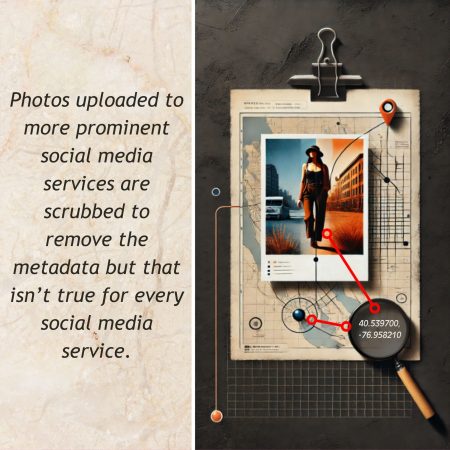Don’t Let Your Photos Betray You

Sharing personal images on social media can be an enjoyable way to share your experiences, but it also raises privacy concerns. Photos uploaded to more prominent social media services are scrubbed to remove the metadata – hidden details embedded in a picture or video file – but that isn’t true for every social media service.
 Once you upload a photo, controlling where it goes is almost impossible. Even with privacy settings, people can download, share, or screenshot your photos, potentially exposing you to unwanted attention or misuse. Photos can reveal a lot about you, such as your location, home, car, workplace, etc. This information, combined with other details online, can be used for identity theft, where someone impersonates you for financial gain or other malicious purposes.
Once you upload a photo, controlling where it goes is almost impossible. Even with privacy settings, people can download, share, or screenshot your photos, potentially exposing you to unwanted attention or misuse. Photos can reveal a lot about you, such as your location, home, car, workplace, etc. This information, combined with other details online, can be used for identity theft, where someone impersonates you for financial gain or other malicious purposes.
Malicious actors can use your photos for harmful purposes like creating fake profiles, catfishing, or deepfakes, which are manipulated videos that make it appear like you’re doing or saying something you didn’t. This can lead to reputational harm even though the photo isn’t valid! Speaking of reputational damage, a seemingly harmless photo could be taken out of context or misinterpreted, leading to reputational harm in personal or professional spheres. Pictures from your past or embarrassing moments can resurface years later, causing unintended consequences.
Tips to protect your privacy when posting images:
- Think Before You Post: Ask yourself, “Who needs to see this photo?” and “Would I be comfortable with this being public forever?” If unsure, err on caution and don’t post it.
- Adjust Privacy Settings: Utilize the privacy settings offered by social media platforms to restrict who can see your photos. However, remember these settings aren’t foolproof.
- Be Mindful of Location Data: Disable location services on your camera or edit out geotags before uploading photos to avoid revealing your whereabouts.
- Limit Personal Information: Avoid including details like your home address, license plate, or financial information in your photos or captions.
- Regularly Review and Delete: Periodically review your online presence and delete old or inappropriate photos you no longer want to be accessible.
Remember, online privacy is an ongoing process. Images you post online may contain hidden details that can compromise your security. Be aware of what you’re sharing and consider how it might be used against you to compromise your security.
Share:
Disclosures
The material on this site was created for educational purposes. It is not intended to be and should not be treated as legal, tax, investment, accounting, or other professional advice.
Securities and Insurance Products:
NOT A DEPOSIT | NOT FDIC INSURED | NOT BANK GUARANTEED | NOT INSURED BY ANY FEDERAL GOVERNMENT AGENCY | MAY LOSE VALUE
